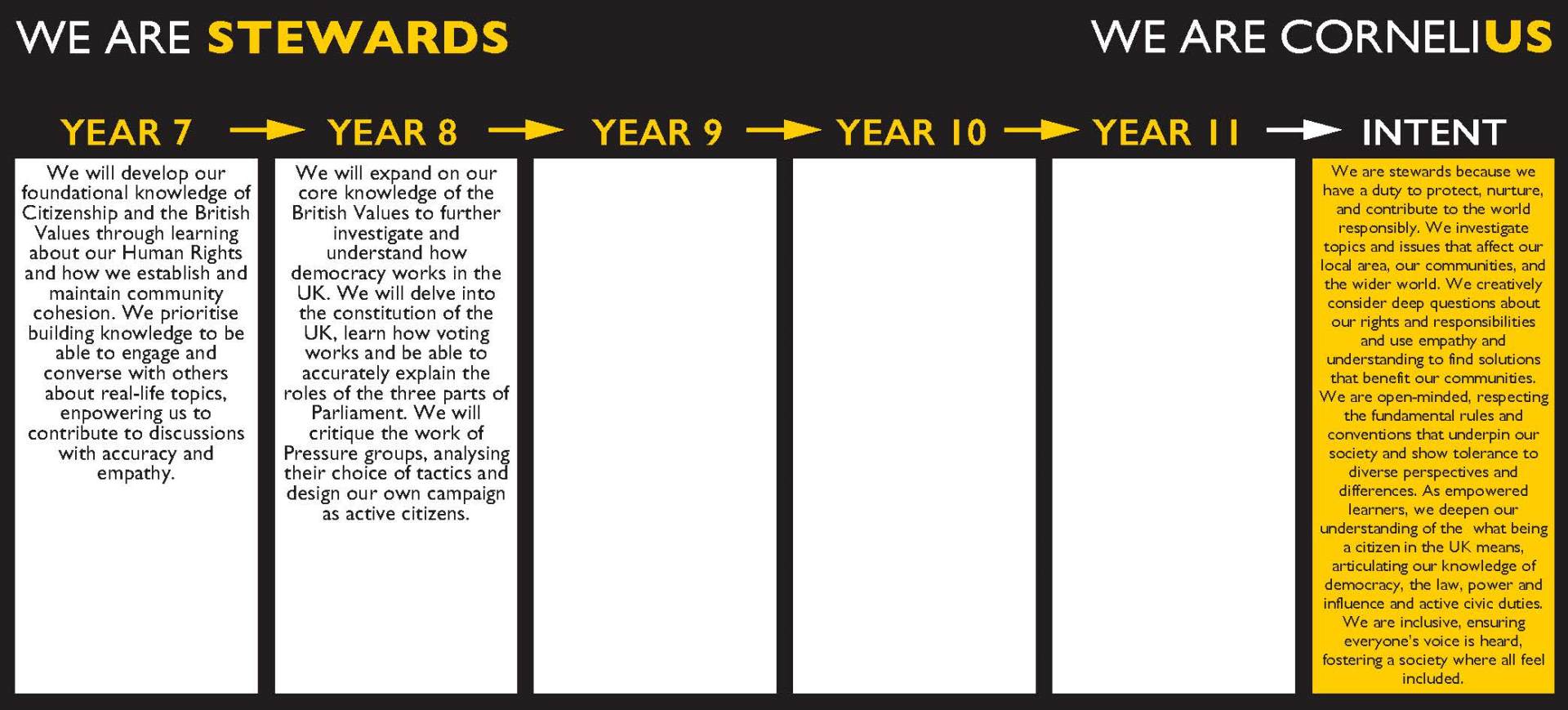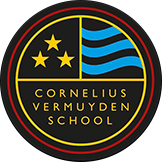Citizenship
Intent

Career Opportunities in Citizenship
The study of Citizenship helps students become informed, active, and responsible members of society. It develops a strong understanding of democracy, law, human rights, and social justice, alongside valuable skills such as debating, critical thinking, teamwork, and communication. These transferable skills make Citizenship an excellent foundation for careers in law, politics, civil service, journalism, education, public policy, international relations, and social work.
Citizenship also supports pathways into roles that involve working with people and communities, such as policing, youth work, charity and voluntary sector roles, and community development. Employers and universities value the subject for its focus on active participation, ethical decision-making, and understanding of current affairs—essential attributes for a wide range of professional environments.
Year 7 Curriculum Overview
Autumn
| What are we learning? | What knowledge, understanding and skills will we gain? | What will excellence look like? | How will we recognise progress? |
|
|
|
|
|
Spring
| What are we learning? | What knowledge, understanding and skills will we gain? | What will excellence look like? | How will we recognise progress? |
| Human Rights |
You will learn the four main documents that support and protect our Human Rights. You will be able to recall their names, where they originated and explain their legal powers accurately. You will learn how Human Rights underpin and enhance our society, why they were created and what they aimed to achieve. You will learn how Human Rights apply to everyone and how they help to create a fairer, kinder and more just society. |
You will understand the key terms we learn and how to use them effectively in sentences. You will be able to recognise and dispel misinformation and misunderstandings. You will be able to apply your learning to the wider world. |
Instant feedback MCQ Questioning Written work in the lesson Whole Class Feedback Self-evaluation |
Summer
| What are we learning? | What knowledge, understanding and skills will we gain? | What will excellence look like? | How will we recognise progress? |
|
Community Cohesion |
You will learn about the political and cultural background of the UK, that we are a multicultural, multifaith union of countries (England, Northern Ireland, Scotland and Wales) each with their own distinct cultures but with shared traditions and histories. You will learn about how the UK has made all different types of people welcome through learning about circumstances of migration and the values that has been added by diversity. You will learn about our heritage, culture and religions and how by showing respect we can build cohesion and a stronger sense of community. You will learn that we have more in common than divides us, how we celebrate Britishness and what brings multiple identities together. You will learn how to identify and challenge divisive behaviours. You will employ your investigating and inquiry skills to reach balanced conclusions using empathy to consider other points of view. You will participate in debates, interpreting sources and scenarios through your analytical skills, whilst using your critical thinking skills to challenge and refute incorrect stereotypes. You will morally reflect on your own thoughts and compose extended writing pieces to demonstrate your knowledge. You will evaluate and critique methods to improve cohesion in the UK. |
You will complete the learning activities with dedication and accuracy, striving to complete the extension and challenge tasks. You will understand the key terms we learn and how to use them effectively in sentences. You will be able to recognise and dispel misinformation and misunderstandings and compose thoughtful responses using more than one point of view to reach your own conclusion. You will be able to apply your learning to the wider world. |
Instant feedback MCQ Teacher questioning Written work in the lesson Whole Class Feedback |
Year 8 Curriculum Overview
Autumn
| What are we learning? | What knowledge, understanding and skills will we gain? | What will excellence look like? | How will we recognise progress? |
|
|
|
|
Spring
| What are we learning? | What knowledge, understanding and skills will we gain? | What will excellence look like? | How will we recognise progress? |
| Democracy at work in the UK |
You will learn key information about how democracy works in the UK at both a local level (MPs and councillors) and at a national level (Government and Parliament). You will know who can vote and who can’t, how we vote, and how people persuade us to elect them through campaigning, their manifestos and hustings. You will understand the difference between Representative Democracy and Direct Democracy and debate whether we should change our voting system. You will build on your debating skills, analyse sources and scenarios, and use your interpretation skills. You will employ new knowledge to compose extended writing pieces to convince others of your opinions. You will use empathy and respect throughout your responses, spoken and written. |
You will understand and be able to recall the key information about how democracy works in the UK. You will understand the key terms we learn and how to use them appropriately in sentences. You will be able to explain where our style of democracy comes from and how it is employed in our everyday lives. |
Instant feedback MCQ Questioning Written work in the lesson Whole Class Feedback Self-evaluation |
Summer
| What are we learning? | What knowledge, understanding and skills will we gain? | What will excellence look like? | How will we recognise progress? |
|
Pressure Groups |
You will learn about the vital role Pressure Groups play in our society by them raising awareness, holding the government to account and supporting citizens. We will learn about their causes and their tactics, which we may not agree with, but we will understand that they have a right to protest. You will investigate some campaigns and methods and evaluate why they have been successful and the impact they have had on our society. You will learn the difference between promotional and sectional causes and how we as citizens can make a change to the world. You will employ your Investigating and inquiry skills to reach balanced conclusions using empathy to consider other points of view. You will participate in debates, interpreting sources and scenarios through your analytical skills, whilst using your critical thinking skills to challenge and refute commonly accepted perceptions. You will morally reflect on your own thoughts, developing your societal and ethical thinking skills to compose extended writing pieces to demonstrate your knowledge. You will evaluate and critique methods used by Pressure Groups to demonstrate your new knowledge. |
You will complete the learning activities with dedication and accuracy, striving to complete the extension and challenge tasks. You will understand the key terms we learn and how to use them effectively in sentences. You will be able to respond with passion but also know when to remove your personal emotion from the debate and compose thoughtful responses using more than one point of view to reach your own conclusion. You will be able to apply your learning to the wider world. |
Instant feedback MCQ Teacher questioning Written work in the lesson Whole Class Feedback Final presentation in class |




